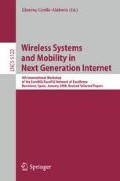Abstract
In this paper, we enhance the mobility model presented in [1], considering a wider range of the directional movement parameter (α). Both random walk and totally directional mobility patterns are modeled. This model is used as an input to study and compare the location management cost of the movement-based strategies [2] and the distance-based scheme as a function of the mobile terminal directional mobility patterns. In [2], each time the mobile terminal revisits the last cell it had contact with the fixed network, its movement-counter is increased with probability p or it is frozen (stopped) with probability q or it is reset with probability r, (p + q + r = 1). We discuss the trade off between the location update cost and the terminal paging cost. The distance-based strategy outperforms all the movement-based schemes. Among all the movement-based mechanisms, the (p,q,r) = (0,0,1) –reset strategy– provides the best performance. All studied schemes tend to perform equally as the movement is more directional.
Access this chapter
Tax calculation will be finalised at checkout
Purchases are for personal use only
Preview
Unable to display preview. Download preview PDF.
References
Martinez-Arrue, I., Garcia-Escalle, P., Casares-Giner, V.: Mobile user location management under a random-directional mobility pattern for PCS networks. In: Third International Working Conference on Performance Modelling and Evaluation of Heterogeneous Networks, P28/1–P28/10 (2005)
Casares-Giner, V., Garcia-Escalle, P.: On Movement-based mobility tracking strategy-A general framework. In: IEEE Wireless Communications and Networking Conference, vol. 4, pp. 1957–1962 (2004)
Camp, T., Boleng, J., Davies, V.: A survey of mobility models for ad hoc network research. Wireless Communications and Mobile Computing 2(5), 483–502 (2002)
Bettstetter, C., Hartenstein, H., Perez-Costa, X.: Stochastic properties of the random waypoint mobility model. Wireless Networks 10(5), 555–567 (2004)
Lombardo, A., Palazzo, S., Schembra, G.: A comparison of adaptive location tracking schemes in personal communications networks. International Journal of Wireless Information Networks 7(2), 79–89 (2000)
Tung, T., Jamalipour, A.: Adaptive location management strategy to the distance-based location update technique for cellular networks. In: IEEE Wireless Communications and Networking Conference, vol. 1, pp. 172–176 (2004)
Garcia-Escalle, P., Casares-Giner, V., Mataix-Oltra, J.: Reducing location update and paging costs in a PCS network. IEEE Transactions on Wireless Communications 1(1), 200–209 (2002)
Bar-Noy, A., Kessler, I., Sidi, M.: Mobile users: To update or not to update? In: Proceedings of INFOCOM 1994, pp. 570–576 (1994)
Bar-Noy, A., Kessler, I., Sidi, M.: Mobile users: To update or not to update? Wireless Communications Journal 1(2), 175–185 (1995)
Vidal, R., Paradells, J., Casademont, J.: Labelling mechanism to support distance-based dynamic location updating in cellular networks. IEEE Electronics Letters 39(20) (2003)
Ho, J.S.M., Akyildiz, I.F.: Mobile user location update and paging under delay constraints. Wireless Networks 1(4), 413–425 (1995)
Akyildiz, I.F., Ho, J.S.M., Lin, Y.B.: Movement-based location update and selective paging for PCS networks. IEEE/ACM Transactions on Networking 4(4), 629–638 (1996)
Zonoozi, M.M., Dassanayake, P.: User mobility modeling and characterization of mobility patterns. IEEE Journal on Selected Areas in Communications 15(7), 1239–1252 (1997)
Kleinrock, L.: Queueing systems, vol. 1. John Wiley & Sons, Chichester (1975)
Casares-Giner, V., Mataix-Oltra, J.: On movement-based mobility tracking strategy-An enhanced version. IEEE Communications Letters 2(2), 45–47 (1998)
Casares-Giner, V.: Variable bit rate voice using hysteresis thresholds. Telecommunication Systems 17, 31–62 (2001)
Author information
Authors and Affiliations
Editor information
Editors and Affiliations
Rights and permissions
Copyright information
© 2008 Springer-Verlag Berlin Heidelberg
About this paper
Cite this paper
Martinez-Arrue, I., Garcia-Escalle, P., Casares-Giner, V. (2008). Location Management Based on the Mobility Patterns of Mobile Users. In: Cerdà-Alabern, L. (eds) Wireless Systems and Mobility in Next Generation Internet. EuroNGI 2008. Lecture Notes in Computer Science, vol 5122. Springer, Berlin, Heidelberg. https://doi.org/10.1007/978-3-540-89183-3_15
Download citation
DOI: https://doi.org/10.1007/978-3-540-89183-3_15
Publisher Name: Springer, Berlin, Heidelberg
Print ISBN: 978-3-540-89182-6
Online ISBN: 978-3-540-89183-3
eBook Packages: Computer ScienceComputer Science (R0)

